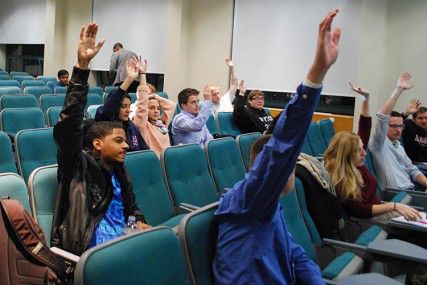
College of Arts and Sciences building. PHOTO BY FALON MORAN/DAILY FREE PRESS STAFF
Boston University student group Common Sense Action held its first Campus Congress Wednesday night, where students debated a wide range of policy issues which will be brought to the national CSA conference in January.
“Common Sense Action, or CSA, seeks to promote generational equity, which pretty much just means that we feel as though our representatives in Congress aren’t actually representing us,” said President of BU’s chapter of CSA Abby Fletes, a College of Arts and Sciences senior. “This can be seen in recent policies that have been passed, which don’t really follow the interests of our generation.”
At Campus Congress, students and CSA board members debated seven policies which were put forth by four committees concentrating on various issue areas such as fiscal responsibility, millennial investments, public service and economic mobility.
During the debates, students were able to voice their opinions and amend each of the proposals. After amendments were proposed, attendees voted on policies. Six out of the seven proposals were passed, while one was tabled for further discussion at a later time.
Campus Congress began with a speech from Kei Kawashima-Ginsberg, the deputy director of the Tufts University Center for Information and Research on Civic Learning and Engagement. Kawashima-Ginsberg said student involvement in politics is an important part of students serving the community.
“The challenge here is connecting the passion for service to politics,” Kawashima-Ginsberg said. “Most young people are unsure about the value of public service. 25 percent of young people believe that there is anything that you can do through politics.”
Passed proposals aimed to improve schools in urban areas, reduce incarceration rates for non-violent drug crimes, promote green energy, provide better mental health resources for Americans, reinstate Section 4 of the Voting Rights Act and raise the debt ceiling.
An additional proposal would require the federal government to allocate a small amount of funding to the Corporation of National Community Services in relation to military spending. The tabled proposal would raise the age for full Social Security benefits from 65 to 70.
The policies that passed will be taken to BU Student Government for approval. Once approved, they will be presented in January at the national CSA conference in Washington.
Committee Chair for Millennial Investments Jessye Stein said the energy proposal passed encourages policymakers to focus on reducing carbon dioxide emissions.
“We are looking to enact policies that are thing we can invest in for the future,” Stein, a CAS senior, said. “We need to encourage responsible use of energy. We are beyond crisis. We are in panic mode.”
The education policy reform that was passed aims to diversify curricula and increase teaching staff at underperforming urban schools, said CSA member Pete Stephan.
“Our objective is to help students compete in a global work force,” Stephan, a CAS senior, said. “One way is to create more numbers of quality staff and to develop that staff. Our focus is on the severely underperforming schools in urban areas.”
Andres Vargas, a CAS junior, said he was glad to see college students engaging in policy making.
“I’m personally very passionate about civic engagement myself, so it’s really nice to see college students out here … because a lot of college students don’t really engage with the political realm because they’re very disinterested with what’s going on in Washington or even what’s going on locally,” he said. “It’s great that we engage in these discussions to try to get something going despite the dysfunction of Congress.”
Briana West, a Sargent College of Health and Rehabilitation Sciences senior, said she found the Campus Congress very informative.
“It opened my eyes to a lot of different aspects to policies happening right now that I don’t know very much about,” she said. “I know there is an issue with Social Security, and there’s an issue with the debt ceiling, but all of the ramifications that go into different policies to solve them — I had no idea they were so extensive.”

















































































































